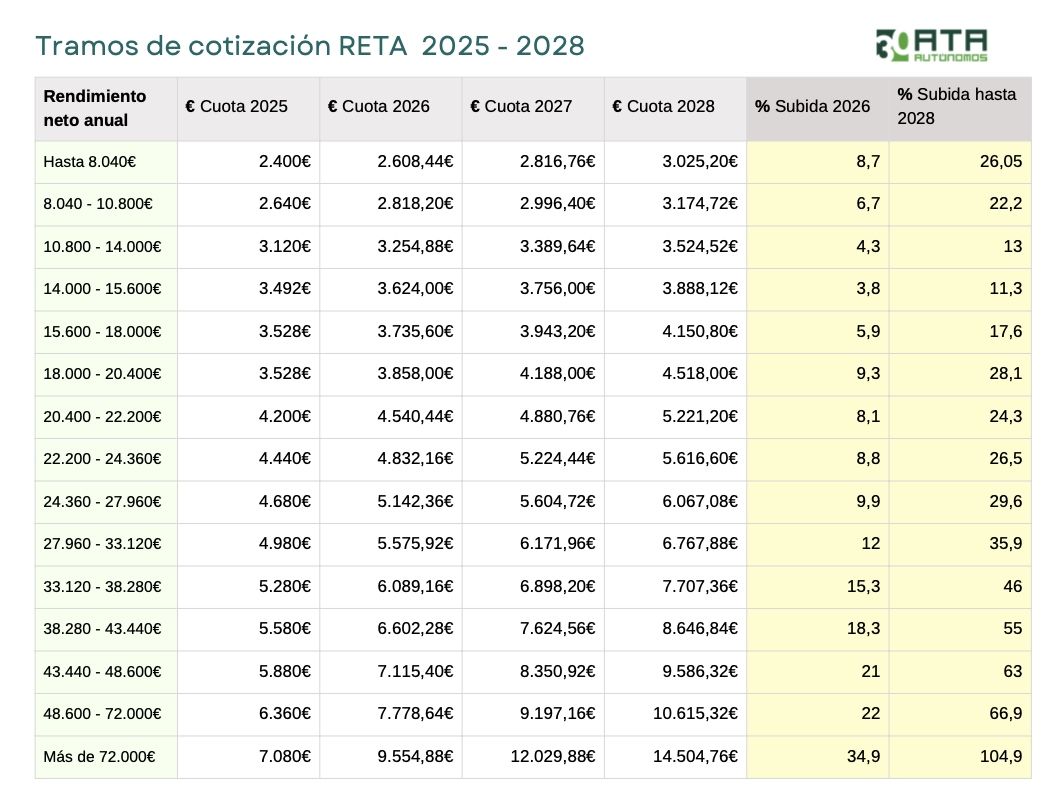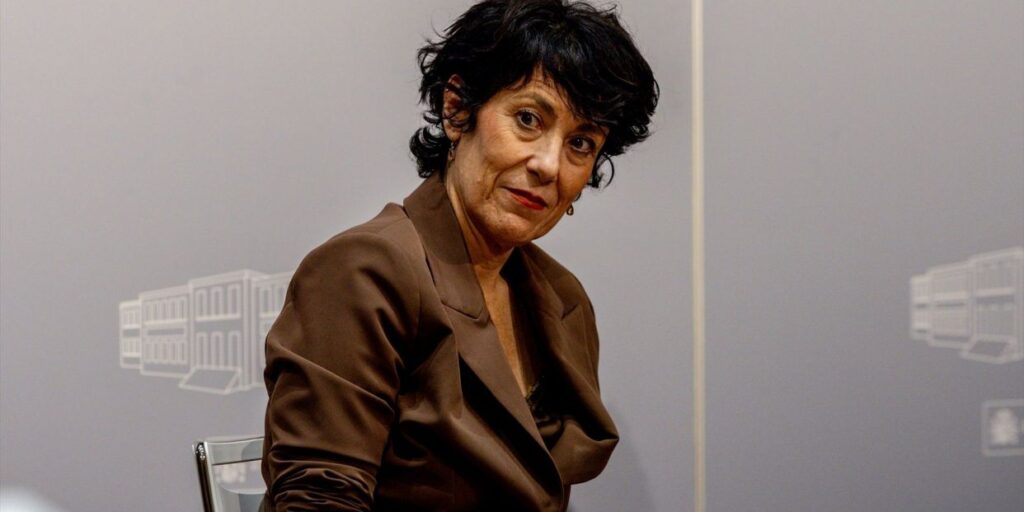The Government proposes to increase self-employed fees between 17 and 206 euros/month in 2026
The socialist part of the Government would be left alone in the Congress of Deputies if the proposal of the Ministry of Inclusion, Social Security and Migration of raise self-employed quotas starting in 2026.
This has been warned by the majority of political groups, who react this way to the monumental anger of the main organization of self-employed people, ATA (@autonomosata), along with the strong reviews of UATAE (@uatae_es) and demands for substantial improvements on the part of UPTA (@upta_es). This is the first impact of the proposal new sections and installments for the self-employed from 2026, that he Government has presented this Monday, and that it must be debated at the Pension Social Dialogue Table (where the UGT and CCOO unions also participate, plus the CEOE-Cepyme employers’ association).
However, given the commotion caused, the parties of the opposition, from the investiture block and even the minority partner of the Executive have come out to criticize the proposal of the department he directs Elma Saiz. More specifically, PP, Vox, Junts, ERC and Sumar reject the measure proposed by the minister.
The second vice president and minister of Labor and Social Economy herself, Yolanda Diaz, He stated this Tuesday that if the quota proposal is as described, his party, Sumar, will not support her, because “it penalizes lower incomes.” “At Sumar we do not share it. Progressivity starts at the bottom. We are talking about 3,400,000 people in Spain. The self-employed are a lot of people who fight every day to be able to live a little better,” said Díaz.
ATA: “The Government’s plan is a sabbath”
He more vehement in their criticisms and denunciations of the proposed increases is the president of ATA and vice president of the CEOE, Lorenzo Love, that calls the Government’s plan a “sablazo” and has rushed to contact PP, Vox and Junts so that he Congress of Deputies falls this new contribution scheme, in case it reaches the Cortes.
“Of course, the Royal Decree that the Government prepares will not have our endorsement. And I hope that it will not have the endorsement of Congress either,” Amor emphasizes. “I understand that the macroeconomic data is there, but it cannot cloud the fact that the self-employed are increasingly experiencing a more complicated situation. Raise those who earn 4,000 euros a year, 600 euros in contributions, and that reaches 7,500 euros in the next three years, that is a sablazo and the self-employed cannot bear it,” he warns.

The president of ATA denounces that, With the Government’s proposal, 100% of the self-employed will pay more in the next three years. “But not a little more, but between 625 euros, who wins the least, up to 2,500 euros more in installments”.
Amor emphasizes that “the increase in quotes is another drop that makes the glass already overflowing. And we are seeing that in the last year 14,000 self-employed businesses have closed in our country. “We are going to work everything possible so that this sabbath does not see the light of day in 2026.”

UATAE criticizes: “Fees for the vulnerable are raised”
For its part, the Union of Associations of Self-Employed Workers and Entrepreneurs (UATAE @uatae_es) criticizes the impact of the new tables of sections and quotas raised by the Government about people with lower incomes. According to their analysis, the document presented by Social Security raises a increase in quotas for lower income groups, which could break the agreed dynamic in 2022.
“If we want the RETA reform to serve to bring the contribution closer to real income, we cannot ask for more effort, precisely from those who have the least,” he highlighted. María José Landaburu (@MJLandaburu), general secretary of UATAE. “We trust that in the next meetings we can correct these imbalances and build a fairer and more sustainable model, where the social protection of the entire group is highlighted.”
In terms of social protection, UATAE calls for simplifying access to benefit for cessation of activity, avoiding requirements that make it practically inaccessible for the majority of the group. “More than 80% of the self-employed are natural persons without employees, we cannot require them to be broke to access a basic benefit,” explained Landaburu.
Likewise, it calls for addressing other pending issues such as unemployment benefits or the integration of contribution gaps, fundamental elements to guarantee decent pensions and long-term stability.
UPTA calls for lower income bracket
More moderate in criticism, the organization of UPTA self-employed (@upta_es) considers that the new section table looks similar to the one agreed in 2022 between unions, employers and the Government, although claims some improvements of the same, among them, “establishing a lower section to the lowest section that exists for freelancers in the artistic field or for content creators.
According to Eduardo Abad (@EDUARDOABADSABA), president of UPTA, the need for adapt these tables to economic situations that may come”, specifying that these very low contributions would only apply to the self-employed whose Annual income does not exceed 4,000 euros and who are already affiliated within other regimes.
This is the increase proposed by the Government
The Ministry’s proposal for the real income quote of the self-employed to 2026-2028, details the fee increases in each of the years of this period.
Specifically, it proposes raising 2026 the monthly fees currently paid by self-employed workers They quote for the minimum base between 17.37 euros and 206.24 euros, depending on their net returns.
1.- Reduced table, with sections with lower incomes:
– The self-employed on a minimum basis with net returns less than 670 euros per month would pay a fee 217.37 euros per month, compared to the current 200 euros, with a minimum base of 710.35 euros, in accordance with the Ministry’s approach. For 2027, The monthly fee in this first section of the reduced table would rise to 234.73 euros and in 2028 would escalate to 252.10 euros per month.
– For the self-employed on a minimum basis with net returns between 670 and 900 euros per month, the monthly fee would rise from the current 220 euros to 234.85 euros in 2026; to 249.70 euros in 2027 and to 264.56 euros in 2028.
– Net returns over 900 euros and up to 1,166.70 euros would increase their current fee from 260 euros to 271.24 in 2026; to 282.47 euros in 2027 and to 293.71 euros in 2028.
2.- General table of net returns
– The table of net returns of more than 1,166.7 euros monthly It consists of 12 sections. If quoted for minimum base, the fees would range from 302 euros per month in the first tranche (net returns of between 1,166.7 and 1,300 euros per month) up to 796.24 euros of the twelfth bracket (income exceeding 6,000 euros), in contrast to the 291 and 590 euros, respectively, that the self-employed now pay.
– For 2027, the quotas in these 12 sections of the general table, if quoted by the minimum base, would range between 313 and 1,002.49 euros monthly fee, while by 2028 they would range from 324.01 to 1,208.73 euros per month, according to the proposal delivered by the Ministry to self-employed organizations and social agents.


